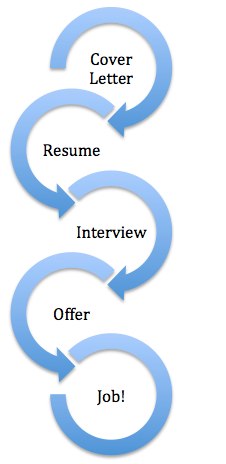Job Search Metrics - Know Your Score
/How's the job search going? Don't you just hate that question? As long as you are still looking, it's not going well enough, right? Since the goal of a job search is to get a job, it's simple: it's either going or it isn't.
Not very useful, I know.
But how is it really going?
What's your score?
Unless you know how well your actions lead to results, you have no idea where to improve.
Your job search is a sales effort. Sales, or the efficiency of a sales person, is all about the numbers. An effective salesperson knows exactly how many cold calls it takes to get an appointment, how many appointments it takes to get the opportunity to ask for the business and how many closes it takes it takes to get a sale. You should also know these numbers.
Keep a journal or a spreadsheet and track every element of your job search.
Your method of tracking success and stats might look like this:
![]()
Your tracking should help you answer these four questions:
- What is my ratio of resumes (or applications) to interviews?
- What is my ratio of interviews to offers?
- Which source yields the best results?
- What percentage of interviews result in a job offer?
As an example, let's use these data:
- 12 resumes
- 4 first interviews
- 2 second interviews
- 1 job offer
Your ratio of resumes to interviews is 12:4, which means every resume you submit is 1/3 of a interview, and each first interview is 25% of a job.
And here's where the most important number comes in. Not to get too heavy with the math, but using the fictitious data above, every resume is 8.3% of a job. Even the resumes that don't result in an interview are getting you closer to a job.![]()
Track your progress and results with every job opportunity. To help you focus your efforts in the future, track your interview score, using the ratio of resumes to interviews, by source. Spend more time using the websites that result in more interviews. I realize that sounds obvious, but unless you are keeping score, you won't actually know, objectively, how you're doing.
So, what's your score?






 Your resume has one job: to get you an interview.
This is why you don't need an objective on your resume. Your objective is to get an interview.
Your resume has one job: to get you an interview.
This is why you don't need an objective on your resume. Your objective is to get an interview.


 A resume by any other name is still a resume. Even if it's the dreaded résumé or, worse, resumé. I'd rather you call it a curriculum vitae, even though 99.99% of curriculum vitaes are really just resumes.
So, what's the correct way to spell it?
A resume by any other name is still a resume. Even if it's the dreaded résumé or, worse, resumé. I'd rather you call it a curriculum vitae, even though 99.99% of curriculum vitaes are really just resumes.
So, what's the correct way to spell it?


A job fair can be an effective way to meet hiring managers and recruiters in your community and learn about many job opportunities in one day. If you are prepared and use your time wisely, you can walk away with many strong job leads. Many job seekers make careless mistakes that can hurt their chances of success at a job fair. Here are 16 simple tips to make your next job fair a success.